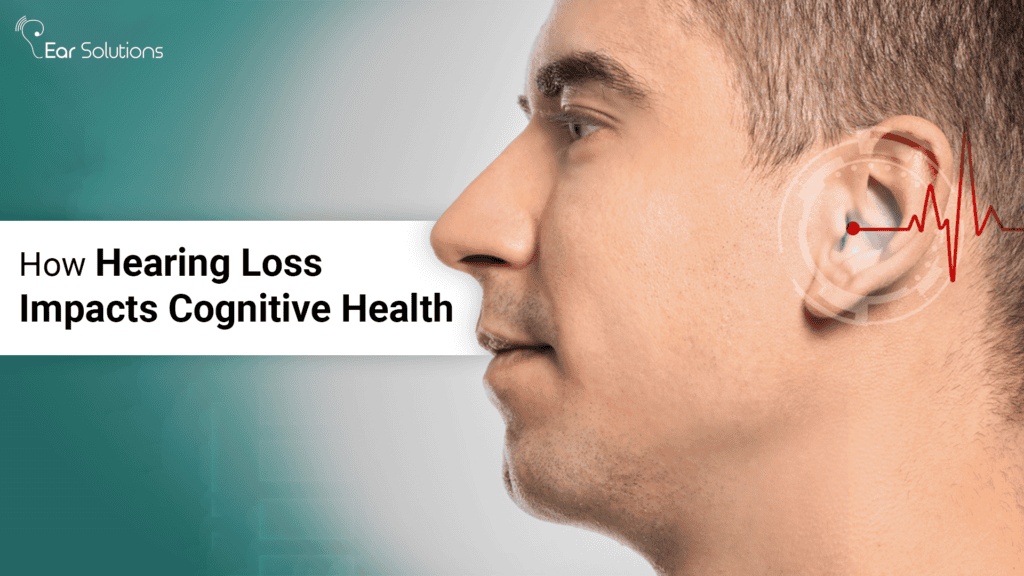Hearing loss is often viewed as a simple inconvenience, something that makes conversations more difficult or requires the use of hearing aids. However, some research shows that the consequences of untreated hearing loss extend far beyond the auditory system. One of the most significant, yet often overlooked impacts is on an individual’s cognitive health. In this blog, we will explore how hearing loss affects cognitive function, the possible risks involved, and the importance of addressing hearing impairment to maintain overall brain health.
The Link Between Hearing and Cognitive Health
The connection between hearing and cognitive health is rooted in the brain’s need to process sound. When you deal with hearing loss, the brain must work harder to interpret sounds and understand speech. This increased load on your brain can reduce other mental processes, that can lead to cognitive decline over time. Here’s a closer look at how this process unfolds:
Increased Cognitive LoadWhen hearing is impaired, the brain compensates by reallocating resources to help understand auditory information. This increased effort can reduce the brain’s capacity to perform other cognitive tasks, such as memory and problem-solving.
Social IsolationDifficulty in hearing often leads to social withdrawal, as individuals may avoid conversations and social settings where they struggle to communicate effectively. Social isolation is a well-documented risk factor for cognitive decline and dementia.
Auditory DeprivationProlonged periods of hearing loss can lead to auditory deprivation, where the brain’s auditory pathways weaken due to lack of stimulation. This can further exacerbate cognitive decline as the brain loses efficiency in processing sound.
Brain AtrophyStudies have shown that untreated hearing loss can lead to faster rates of brain atrophy, particularly in regions involved in processing sound and speech. Brain atrophy is closely linked to cognitive impairments and dementia.
What Does Research Show About Hearing Loss and Cognitive Health?
Numerous studies have shown the relationship between hearing loss and cognitive decline. Specifically, the risk of dementia is twice as high for those with mild hearing loss, three times higher for those with moderate hearing loss, and five times higher for those with severe hearing loss.
Read More About: Types Of Hearing AidsThis can lead to reductions in brain volume and impairments in memory, attention, and executive function. The studies underscore the importance of addressing hearing loss not just for auditory health but for overall cognitive well-being.
Best Ways to Improve Cognitive Health if Having Hearing Loss
While the link between hearing loss and cognitive decline is distressing, there are some steps that individuals can take to deal with hearing loss and to improve brain function:
Early Detection and InterventionRegular hearing assessments are crucial, especially for older adults. Early detection of hearing loss allows for timely intervention, which can help preserve cognitive health.
Using Hearing AidsModern hearing aids are highly effective at improving hearing and reducing the cognitive load associated with processing sounds. By restoring better hearing, hearing aids can help maintain cognitive health and improve quality of life. Hearing aids are the only option that can be effective as well as affordable for most individuals. If you or your known is dealing with hearing loss then ignoring it might lead to cognitive decline. It can be managed with the help of hearing aid devices.
Cochlear ImplantsFor individuals with severe hearing loss, cochlear implants can provide significant benefits. These devices bypass damaged parts of the ear and directly stimulate the auditory nerve, improving hearing and potentially slowing cognitive decline.
Aural RehabilitationAural rehabilitation programs, which include training in lip-reading, auditory exercises, and communication strategies, can enhance the effectiveness of hearing aids and improve cognitive outcomes.
Social EngagementStaying socially active and engaged is crucial for cognitive health. Participating in social activities, joining support groups, and maintaining strong relationships can help counteract the effects of hearing loss on cognitive function.
Conclusion
The connection between hearing loss and cognitive health highlights the importance of addressing hearing impairments promptly and effectively. By understanding the broader implications of hearing loss, individuals can take proactive steps to protect their cognitive health and overall well-being. If you or a loved one is experiencing hearing difficulties, consider seeking professional advice at Ear Solutions and exploring hearing aid options to ensure a healthier, more connected future.

Prerna Singh
Audiologist, Ear Solutions
Prerna Singh is an Audiologist at Ear Solutions, focused on delivering compassionate, patient-centric hearing care. She works closely with individuals to understand their hearing concerns and guide them toward practical, technology-driven solutions that improve everyday communication and confidence.
At Ear Solutions, Prerna supports the organization’s long-standing mission of transforming lives through better hearing. She is committed to hearing awareness, accurate assessments, and continuous patient support-ensuring every individual receives the care they need to hear better and live better, in line with the vision of #AbSabSunenge.





